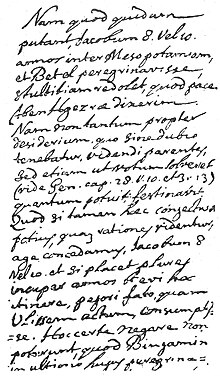
Back رسالة في اللاهوت والسياسة Arabic Tractat teològico-polític Catalan Tractatus theologico-politicus German Tratado teológico-político Spanish Tractatus theologico-politicus Estonian رساله الهی سیاسی (اسپینوزا) Persian Tractatus theologico-politicus Finnish Traité théologico-politique French מאמר תאולוגי-מדיני HE Tractatus Theologico-Politicus ID
 | |
| Author | Baruch Spinoza |
|---|---|
| Country | Dutch Republic |
| Language | Latin |
Publication date | 1670 |
| 199/.492 | |

The Tractatus Theologico-Politicus (TTP) or Theologico-Political Treatise, is a 1670 work of philosophy written in Latin by the Dutch philosopher Benedictus Spinoza (1632–1677). The book was one of the most important and controversial texts of the early modern period. Its aim was "to liberate the individual from bondage to superstition and ecclesiastical authority."[3] In it, Spinoza expounds his views on contemporary Jewish and Christian religion and critically analyses the Bible, especially the Old Testament, which underlies both. He argues what the best roles for state and religion should be and concludes that a degree of democracy and freedom of speech and religion works best, such as in Amsterdam, while the state remains paramount within reason. The goal of the state is to guarantee the freedom of citizens. Religious leaders should not interfere in politics. Spinoza interrupted his writing of his magnum opus, the Ethics, to respond to the increasing intolerance in the Dutch Republic, directly challenging religious authorities and their power over freedom of thought. He published the work anonymously, in Latin, rightly anticipating harsh criticism and vigorous attempts by religious leaders and conservative secular authorities to suppress his work entirely. He halted the publication of a Dutch translation. One described it as being "Forged in hell by the apostate Jew working together with the devil".[4] The work has been characterized as "one of the most significant events in European intellectual history", laying the groundwork for ideas about liberalism, secularism, and democracy.[5]
- ^ The full title tagline in Latin is: Continens Dissertationes aliquot, Quibus ostenditur Libertatem Philosophandi non tantum salva Pietate, et Reipublicae Pace posse concedi: sed eandem nisi cum Pace Reipublicae, ipsaque Pietate tolli non posse. Which in English would mean: Containing several dissertations, without prejudice to the freedom of the Philosophers or to Piety, and to the Peace conceded by the Republic; but also dealing with the Peace of the Republic itself, which without Piety cannot properly continue. To this the Latin text of 1 John 4,13 is added: Per hoc cognoscimus quod in Deo manemus, et Deus manet in nobis, quod de Spiritu suo dedit nobis. (By this we know that we dwell in God, and that God dwells in us, because he has given us of his own Spirit.)
- ^ de Spinoza. Theologisch-politiek traktaat, Amsterdam: Wereldbibliotheek, 1997. Translation in Dutch by F. Akkerman (1997), p. 446.
- ^ Smith, Steven B. Spinoza, Lberalism, and the Question of Jewish Identity. New Haven: Yale University Press 1997, 197
- ^ quoted in Nadler, Steven, A Book Forged in Hell: Spinoza's Scandalous Treatise and the Birth of the Secular Age. Princeton: Princeton University Press 2011, 231
- ^ Nadler, Book Forged in Hell, xi
© MMXXIII Rich X Search. We shall prevail. All rights reserved. Rich X Search